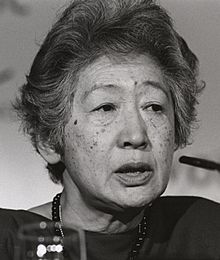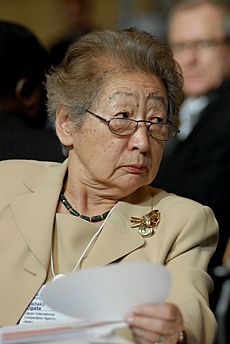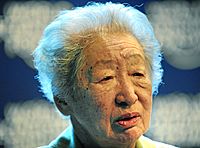Sadako Ogata facts for kids
Quick facts for kids
Sadako Ogata
|
|
|---|---|
|
緒方 貞子
|
|

Sadako Ogata in 1993
|
|
| President of the Japan International Cooperation Agency | |
| In office 1 October 2003 – 30 March 2012 |
|
| Preceded by | Position established |
| Succeeded by | Akihiko Tanaka |
| United Nations High Commissioner for Refugees | |
| In office 3 November 1990 – 31 December 2000 |
|
| Preceded by | Thorvald Stoltenberg |
| Succeeded by | Ruud Lubbers |
| President of the United Nations International Children's Emergency Fund | |
| In office 1978–1979 |
|
| Preceded by | Ferdinand Oyono |
| Succeeded by | Zaki Hasan |
| Personal details | |
| Born |
中村 貞子 (Nakamura Sadako)
16 September 1927 Azabu, Tokyo City, Tokyo Prefecture, Japan (present day Minato, Tokyo, Japan) |
| Died | 22 October 2019 (aged 92) Tokyo, Japan |
| Spouse |
Shijuro Ogata
(m. 1960; |
| Children | Two; including Atsushi Ogata |
| Alma mater | University of the Sacred Heart Georgetown University University of California, Berkeley |
Sadako Ogata, née Nakamura (緒方 貞子, Ogata Sadako, 16 September 1927 – 22 October 2019) was a famous Japanese academic, diplomat, and author. She was a professor at Sophia University.
She was best known for leading the office of the United Nations High Commissioner for Refugees (UNHCR) from 1991 to 2000. This organization helps people who have been forced to leave their homes. She also served as the head of the UNICEF Executive Board from 1978 to 1979. UNICEF helps children around the world. Later, she became the President of the Japan International Cooperation Agency (JICA) from 2003 to 2012. JICA helps other countries develop.
Contents
Early Life and Education
Sadako Nakamura was born in Tokyo, Japan, on September 16, 1927. Her father was a diplomat, which meant her family moved a lot. She lived in the United States from ages 4 to 8. She also lived in China from ages 8 to 10.
Her mother was the daughter of Kenkichi Yoshizawa, who was a Foreign Minister. Her great-grandfather was Inukai Tsuyoshi, a Prime Minister of Japan. He was assassinated when Sadako was four years old.
After World War II, Sadako graduated from the University of the Sacred Heart in Tokyo. She earned a degree in English Literature. Even though it was unusual for Japanese women at that time, she decided to study abroad. She went to Georgetown University in the U.S. and earned a master's degree in International Relations. She wanted to understand why Japan had entered a war.
In 1963, she earned her PhD in Political Science from the University of California, Berkeley. Her studies focused on the reasons behind Japan's invasion of China. In 1960, she married Shijuro Ogata and changed her name to Sadako Ogata. She later taught international politics at Sophia University in Tokyo.
Important Work and Career
Sadako Ogata began her work with the United Nations in 1968. She represented Japan at the UN General Assembly. From 1978 to 1979, she was the Chair of the UNICEF Executive Board.
Leading the UNHCR
In 1990, Sadako Ogata was chosen to lead the United Nations High Commissioner for Refugees (UNHCR). She was the first woman to hold this important position. She was supposed to serve for only three years, but she ended up leading the UNHCR for over a decade, until 2001.
As the head of UNHCR, she helped many refugees. These included people fleeing the Gulf War, the Yugoslav Wars, the Rwandan genocide, and the conflict in Afghanistan. She made sure that UNHCR also helped people who were displaced within their own countries. These people are called IDPs.
She was known for being a very practical leader. She even worked with military forces to help people in need, like during the siege of Sarajevo. Her strong negotiating skills and small size earned her the nickname "diminutive giant." This means a small person with a huge impact.
Work with the Japanese Government
After leaving UNHCR in 2001, she became a special advisor to the Prime Minister of Japan. She helped with the reconstruction efforts in Afghanistan after the September 11 attacks.
In 2003, the Japanese government appointed her as President of the Japan International Cooperation Agency (JICA). JICA is an organization that provides aid to other countries. She focused on "Human Security," which means protecting the safety and well-being of individuals.
Under her leadership, JICA grew to become the world's largest organization for international aid by 2008. She worked at JICA for more than eight years, retiring in 2012.
She was also part of a special council that discussed the rules for the Japanese Imperial family. This council talked about whether female members of the Imperial family should be able to inherit the throne.
In 2012, a special reception was held in Tokyo to honor Sadako Ogata's contributions. The Prime Minister of Japan, Yoshihiko Noda, spoke at the event. He said that the help Japan received after the 2011 earthquake and tsunami was partly thanks to Sadako Ogata's work.
Honors and Awards
Sadako Ogata received many awards and honors for her work.
Japanese decorations
- 2001 Person of Cultural Merit
- 2003 Order of Culture
Other
- 1993 Journalistic prize Golden Doves for Peace
- 1994 Prize For Freedom
- 1995 Liberty Medal
- 1995 Member of the American Philosophical Society
- 1997 Ramon Magsaysay Award
- 2000 Seoul Peace Prize
- 2001 Order of Friendship of Russia
- 2001 Commander's Cross of the Order of Merit of the Federal Republic of Germany
- 2001 Commander of the Légion d'honneur
- 2001 Knight Grand Cross of the Order of Merit of the Italian Republic
- 2001 Commander First Class of the Order of the Polar Star of Sweden
- 2001 Indira Gandhi Prize
- 2002 Fulbright Prize for International Understanding
- 2005 World Citizenship Award
- 2006 Grand Officer of the Order of Lakandula of the Philippines
- 2008 Grand Officer of the Order of Orange-Nassau of the Netherlands
- 2011 Honorary Dame Commander of the Order of St. Michael and St. George (DCMG)
- 2011 Medal of the Friendship of Nations (Danaker Medal) of Kyrgyzstan
- 2013 Band of the Order of the Aztec Eagle of Mexico
- 2013 Grand Cross of the Order of Sikatuna, Rank of Datu
- 2017 Humanitarian Medal Mother Teresa of Kosovo
Quotes
- "If we ignore the plight of the refugees or the burden of the countries which have received them, I fear we will pay a heavy toll in renewed violence. Conditions must be created urgently to allow the refugees to go back and live in peace and tolerance in their own country." — Liberty Medal acceptance speech, 4 July 1995
Personal Life
In 1960, Sadako Nakamura married Shijuro Ogata. He was an official at the Bank of Japan. After their marriage, she became Sadako Ogata. They had two children, a son named Atsushi Ogata (who became a film director) and a daughter. Sadako Ogata passed away on October 22, 2019, at the age of 92.
Family tree
| Tsuyoshi Inukai | |||||||||||||||||||||||||||||
| Misao | Kenkichi Yoshizawa | ||||||||||||||||||||||||||||
| Tsuneko | Toyoichi Nakamura | Taketora Ogata | |||||||||||||||||||||||||||
| Sadako Ogata | Shijūrō Ogata | ||||||||||||||||||||||||||||
| Atsushi Ogata | |||||||||||||||||||||||||||||
See also
 In Spanish: Sadako Ogata para niños
In Spanish: Sadako Ogata para niños
 | Jessica Watkins |
 | Robert Henry Lawrence Jr. |
 | Mae Jemison |
 | Sian Proctor |
 | Guion Bluford |



